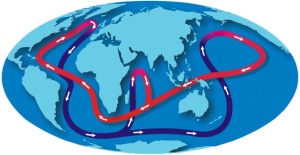
The Great Ocean Conveyor Belt – blue = deep cold and saltier water current, red = shallower and warmer current
[credit: NWS / NOAA]
It's known, or at least believed, that transit times of some ocean waters can be as long as 1,000 years. The researchers are well aware that this exceeds the time since some well-known warming and cooling periods in the Earth's past, such as the Medieval Warm Period and Little Ice Age.
Whereas most of the ocean is responding to modern warming, the deep Pacific may be cooling, say researchers.
The ocean has a long memory. When the water in today's deep Pacific Ocean last saw sunlight, Charlemagne was the Holy Roman Emperor, the Song Dynasty ruled China and Oxford University had just held its very first class.
During that time, between the 9th and 12th centuries, the earth's climate was generally warmer before the cold of the Little Ice Age settled in around the 16th century.
Now ocean surface temperatures are back on the rise but the question is, do the deepest parts of the ocean know that?
Researchers from the Woods Hole Oceanographic Institution (WHOI) and Harvard University have found that the deep Pacific Ocean lags a few centuries behind in terms of temperature and is still adjusting to the entry into the Little Ice Age.
Whereas most of the ocean is responding to modern warming, the deep Pacific may be cooling.
"These waters are so old and haven't been near the surface in so long, they still 'remember' what was going on hundreds of years ago when Europe experienced some of its coldest winters in history," said Jake Gebbie, a physical oceanographer at WHOI and lead author of the study published Jan. 4, 2019, in the journal Science.
"Climate varies across all timescales," adds Peter Huybers, Professor of Earth and Planetary Sciences at Harvard University and co-author of the paper. "Some regional warming and cooling patterns, like the Little Ice Age and the Medieval Warm Period, are well known. Our goal was to develop a model of how the interior properties of the ocean respond to changes in surface climate."
What that model showed was surprising.
Continued here.
from Climate Change Skeptic Blogs via hj on Inoreader http://bit.ly/2R9jVjj
No comments:
Post a Comment